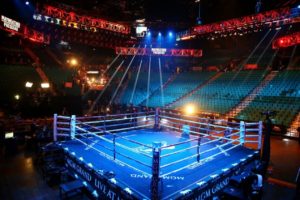Boxing is Alive and Well In Wales
By Donald “Braveheart” Stewart
As we are in 2023, there is something occurring in Wales: boxing. A proud country with plenty of dragons as fighters, this is a country where British broadcasters have woken up to the fact that there are new names to be added to the ones of yore. As people speak in hushed tones of Barry Jones, Enzo Maccarinelli and Joe Calzaghe, names like Joe Cordina and Gavin Gwynne are being added.
But Wales has always had depth in their boxing pools and one name does not often get a nod from the casual observers but is known to the boxing fraternity, Cardiff native Maurice O’Sullivan. One of the reasons, of course, that people do not always mention his name is that he fought exclusively in the amateur code.
But he did go to the Olympics in Munich in 1972.
Representing the Roath Youth Amateur Boxing Club his amateur record was distinguished and he was a teenage winner of the Welsh Amateur title at flyweight. The year that he made the Olympics O’Sullivan won the Welsh light flyweight title again, against Michael Pickett, and also won the British Amateur Boxing Association (ABA) flyweight title.
When he got to Munich he won his first fight – but his journey as to be halted by the eventual finalist Ugandan Leo Rwabwogo, who went on to take the silver home with him. Rwabwogo had already won bronze at the 1968 Olympics and the silver at the 1970 Commonwealth Games, in Edinburgh in 1970. He was a seasoned campaigner, so the loss, though keenly felt, was nevertheless one O’Sullivan was expected to struggle in.
O’Sullivan was one of a team of nine in the British Olympic boxing squad, who did not have a great deal of experience and there was more hope than expectation when they arrived in Munich. Of the nine only two were champions at their weight – O’Sullivan being one of them – though three of them medalled: Alan Minter’s bronze at light middleweight, George Turpin’s bronze at bantamweight and Ralph Evans’ bronze at light flyweight.
O‘Sullivan’s first fight was up against the Frenchman Rabah Kaloufi. It was a points win for O’Sullivan and set up the fight with the Ugandan, though not immediately. In an Olympics that was not shy of tragedy and controversy, Argentinian boxer, Jose Viccario was withdrawn after a fight in the Olympic village. O’Sullivan, having been drawn to fight Japanese boxer, Fujio Nagai, when things were reorganised, O’Sullivan faced the 1968 bronze medallist, Rwabwogo, instead.
It lasted all of 80 seconds.
Rwabwogo stiffened O’Sullivan with a right, O’Sullivan hit the canvass, got up, was ready to go again and got hit once more forcing the referee to step in and stop the contest.
Returning from the Games, O’Sullivan continued to box and in 1974 became the ABA flyweight champion once more.
But perhaps his most notable fight came in an all Welsh affair against Johnny Owens for the Welsh title. It was a controversial win for him, and O’Sullivan reportedly offered the trophy to Owens though Owens, who tragically died in the ring, six years later, refused to accept it.
The controversy was because O’Sullivan was clearly outboxed. Though a vastly more experienced boxer, according to Rick Broadbent, in The Big If, the Life and Death of Johnny Owen, “O’Sullivan felt his face being torn with slashing blows, the whiff of leather being merged with the smell of defeat.” But it was not to be. The judges, one of whom later admitted, according to Broadbent, that they had wanted O’Sullivan to go to the Commonwealth Games that year gave the title to O’Sullivan, and the judging was tilted towards O’Sullivan. Owens was gutted, O’Sullivan shame faced.
There is no record of O’Sullivan going to Auckland for the Games.
Recently however there has been footage of the Roath Youth Amateur and Athletic Club unearthed by a local budding film maker. Believed to be from 1978, though O’Sullivan isn’t identified as being in the footage it is a reminder of how important these clubs were and are to their local community and to the development of their famous boxers. Calzaghe gets a mention as former trainer Gerry Watts remembers fondly – who would not do so of a guy who walked in and beat all the people brave enough to enter the ring with him when he was in the gym. It also reminds us that the depth of a sport is dependent upon the dedication of those who do not have the riches, share the limelight or make the headlines. Maurice O’Sullivan is one such fighter and for that the former Olympian shall be remembered.
Click Here to Order Boxing Interviews Of A Lifetime By “Bad” Brad Berkwitt


